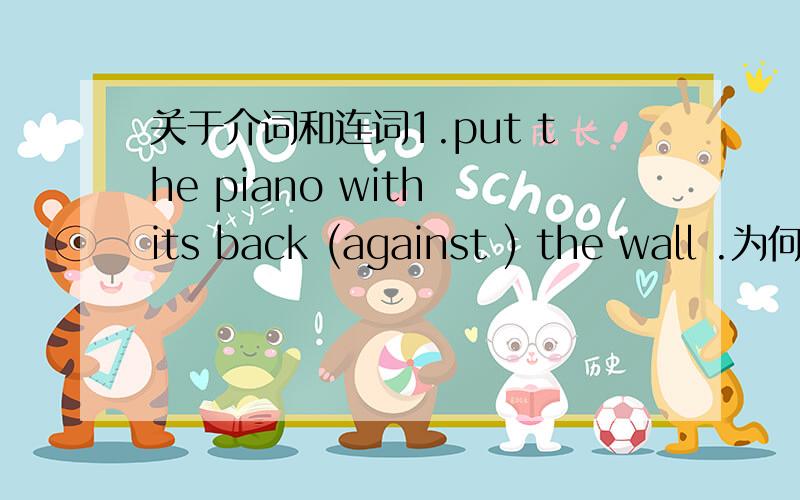关于介词和连词1.put the piano with its back (against ) the wall .为何填此答案,句意又是什么?2.we mended the machine as you told me ,but we also falied .句意是什么?3.tell me-too whether or not I should invite Nike and his wife
来源:学生作业帮助网 编辑:作业帮 时间:2024/11/30 12:25:55

关于介词和连词1.put the piano with its back (against ) the wall .为何填此答案,句意又是什么?2.we mended the machine as you told me ,but we also falied .句意是什么?3.tell me-too whether or not I should invite Nike and his wife
关于介词和连词
1.put the piano with its back (against ) the wall .
为何填此答案,句意又是什么?
2.we mended the machine as you told me ,but we also falied .
句意是什么?
3.tell me-too whether or not I should invite Nike and his wife
此句为何用whether,句意是?
4.I don't know whether to accept or refuse .
同上.
5.I saw him as he was getting on the bus .
as何意?句意?
6.在海平面.几米以下,用below还是under还是都可以?
关于介词和连词1.put the piano with its back (against ) the wall .为何填此答案,句意又是什么?2.we mended the machine as you told me ,but we also falied .句意是什么?3.tell me-too whether or not I should invite Nike and his wife
1.把钢琴背靠墙摆放
against prep.相反,反对,逆着,靠着,倚着
against在这里的意思是:靠着
2.as adv.同样地,被看作,象
prep.当做
conj.与...一样,当...之时,象,因为
as在此句中当连词(conj.)
整句意思是:我们照你告诉我的那样修理这个机器,但是我们还是没修好.
3.这个句子楼主打错了吧,me-too的意思是:vt.模仿,跟随adj.仿造的 原句应该是:tell me whether or not...是吗?
whether or not是固定短语,意思:无论是...或...,是否.此处做是否讲,全句意思:告诉我是否应该邀请奈克和他的妻子.
4.看来楼主对whether的用法存有疑问,请看下面:
whether
conj
---------- 1 ----------
(used before a clause or an infinitive expressing or implying alternatives 用於从句或不定式之前以表达或意含两者之间的选择) (a) (used as the object of vs like know,doubt,wonder,etc 用作know、 doubt、 wonder等动词的宾语):
* I don't know whether I will be able to come.我不知道我是否能来.
* We'll be told tomorrow whether we should take the exam or not.我们明天才知道是不是应该参加考试.
* I asked him whether he had done all the work himself or whether he had had any assistance.我问他这些工作都是他自己做的还是别人帮他做的.(Note that when there are two alternative clauses separated by or,whether is repeated.注意:
* 在两个供选择的从句之间若用or字,则须重复whether一字.)
* We were wondering whether to go today or tomorrow.我们弄不清是今天走还是明天走.
(b) (after adjs and preps 用於形容词或介词之后):
* She was undecided (about) whether she should accept his offer.她拿不定主意应该不应该接受他的好意.
* He hesitated about whether to drive or take the train.他开车去还是坐火车去,犹豫不决.
* It all depends on whether she likes the boss or not.一切都取决於她喜欢还是不喜欢这个老板.
(c) (used as the subject or complement of a sentence 用作句子的主语或补语):
* It's doubtful whether there'll be any seats left.说不上还有没有空座位了.
* The question is whether to go to Munich or Vienna.问题是去慕尼黑还是去维也纳.
---------- 2 ----------
(idm 习语) whether or not (used to introduce two alternative possibilities 用以引导出两种非此即彼的可能性):
* Whether or not it rains/Whether it rains or not,we're playing football on Saturday.无论下不下雨,我们星期六一定踢足球.
* Tell me whether or not you're interested.告诉我你有没有兴趣.
* They'll find out who did it,whether you tell them or not.你告诉不告诉他们,他们都能查出是谁干的.
相信看过上面的解释应该能够明白.
5.as adv.同样地,被看作,象
prep.当做
conj.与...一样,当...之时,象,因为
此句中as做conj,意思:当...之时
整句的意思:我看见他的时候他正上公共汽车.(直译为我看见他,当他正上公共汽车之时.)
6.below指位置低于某物或在某物的下方,但不一定在正下方;
under指在某物的正下方,一般两物体表面有接触.
在海平面几米以下用below,例如:50 metres below sea level.低于海平面50米.